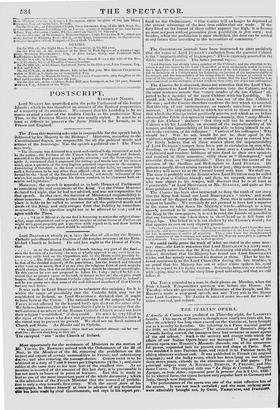Lord BROUGHAM utterly reau dares the idea of allowing the
Roman Catholic priesthood even a fraction of the surplus revenues of the Esta- blished Church in Ireland. He said last night in the House of Peers, that as to the Roman Catholic Church having any part of the fund— even the fraction of a farthing—he was as wholly opposed to any such fatal no- tion as any noble lord on the Opposition vide of the House could possibly he. Dr. Paley said, that in all cases the Established religion should be that of the decided majority of the population; hnt the learned and talented Writer c-ent on to assert, that it' at any time the religious faith of such majority should eltange, then that the estAblished religion should be changed accordingly. TO this extent he was not prepared to follow Dr. Paley : int!ced he felt can • 'winced that no greater curse to Ireland, or danger to her ani the empire, could happen, than that of the Roman Catholic religion being established in Ireland ; and he was pretty sure that none of the well-informed members of that Church lad any such desire.
It was rash in Lord BROUGHAM to volunteer this opinion ; for it is within the range of possibility that the Catholic faith may yet be established in Ireland, as Lord REDESDALE declared that it ought to have been at the Union. The rational view of the subject taken by PALEY is not affected by the learned lord's ipse dint on the odic'. side. We believe, however, that the Chancellor is right in his surmise that the well-informed members of the Roman Catholic Church would not have
their religion "established," if they could. He must be very blind to the signs of the times who does not perceive that to establish a faith is the surest way to prevent its growth. We shall see no fresh unions of Church and State. As Hamlet said to Ophelia,
* We will plave no more marriages : those that arc married already—all taut Shall hive; the rest shall keep as they are."
The excepted "one "is the Church of Ireland.






















 Previous page
Previous page